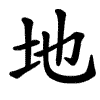Di (Chinese concept) on:
[Wikipedia]
[Google]
[Amazon]
 ''Di'' () is one of the oldest Chinese terms for the
''Di'' () is one of the oldest Chinese terms for the
 ''Di'' () is one of the oldest Chinese terms for the
''Di'' () is one of the oldest Chinese terms for the earth
Earth is the third planet from the Sun and the only astronomical object known to harbor life. While large volumes of water can be found throughout the Solar System, only Earth sustains liquid surface water. About 71% of Earth's surfa ...
and a key concept or figure in Chinese philosophy
Chinese philosophy originates in the Spring and Autumn period () and Warring States period (), during a period known as the " Hundred Schools of Thought", which was characterized by significant intellectual and cultural develop ...
and religion
Religion is usually defined as a social- cultural system of designated behaviors and practices, morals, beliefs, worldviews, texts, sanctified places, prophecies, ethics, or organizations, that generally relates humanity to supernatural, ...
, being one of three powers (', ) which are Heaven, Earth, and Humanity (, ), a phrase which originates from the Yijing
The ''I Ching'' or ''Yi Jing'' (, ), usually translated ''Book of Changes'' or ''Classic of Changes'', is an ancient Chinese divination text that is among the oldest of the Chinese classics. Originally a divination manual in the Western Zho ...
.
Etymology
''Dì'' is the modernMandarin Chinese
Mandarin (; ) is a group of Chinese (Sinitic) dialects that are natively spoken across most of northern and southwestern China. The group includes the Beijing dialect, the basis of the phonology of Standard Chinese, the official language ...
pronunciation. The Old Chinese
Old Chinese, also called Archaic Chinese in older works, is the oldest attested stage of Chinese, and the ancestor of all modern varieties of Chinese. The earliest examples of Chinese are divinatory inscriptions on oracle bones from around 1250 ...
pronunciation has been reconstructed as ''*lˤej-s''.Baxter, Wm. H. & Sagart, Laurent. '' '', pp. 20 & 176. 2011. Accessed 11 October 2011.
The Chinese character
Chinese characters () are logograms developed for the writing of Chinese. In addition, they have been adapted to write other East Asian languages, and remain a key component of the Japanese writing system where they are known as ''kanj ...
is a phono-semantic compound, combining the radical ("earth", "dirt") with the (former) sound marker (Modern Chinese
Standard Chinese ()—in linguistics Standard Northern Mandarin or Standard Beijing Mandarin, in common speech simply Mandarin, better qualified as Standard Mandarin, Modern Standard Mandarin or Standard Mandarin Chinese—is a modern standar ...
''yě'', Old Chinese
Old Chinese, also called Archaic Chinese in older works, is the oldest attested stage of Chinese, and the ancestor of all modern varieties of Chinese. The earliest examples of Chinese are divinatory inscriptions on oracle bones from around 1250 ...
''*lajʔ''). As , it was one of the characters briefly affected by Wu Zetian
Wu Zetian (17 February 624 – 16 December 705), personal name Wu Zhao, was the ''de facto'' ruler of the Tang dynasty from 665 to 705, ruling first through others and then (from 690) in her own right. From 665 to 690, she was first empres ...
's short-lived character reforms.
Taoism
The relationship between Heaven and Earth is important to Taoistcosmology
Cosmology () is a branch of physics and metaphysics dealing with the nature of the universe. The term ''cosmology'' was first used in English in 1656 in Thomas Blount's ''Glossographia'', and in 1731 taken up in Latin by German philosopher ...
. They are among the "three realms" of the world presided over by the Three Great Emperor-Officials
The Three Great Emperor-Officials () are three of the highest Celestial Deities of Taoist religion, and subordinate only to the Jade Emperor
The Jade Emperor or Yudi ( or , ') in Chinese culture, traditional religions and myth is one of th ...
, and thought to maintain the two poles of the "three powers", with humanity occupying the pivotal position between them.
See also
*Agriculture (Chinese mythology)
Agriculture is an important theme in Chinese mythology. There are many myths about the invention of agriculture that have been told or written about in China. Chinese mythology refers to those myths found in the historical geographic area of ...
* Sheji
* Houji
Hou Ji (or Houji; ) was a legendary Chinese culture hero credited with introducing millet to humanity during the time of the Xia dynasty.. Millet was the original staple grain of northern China, prior to the introduction of wheat. His name translat ...
References
External links
* Chinese words and phrases {{China-philo-stub